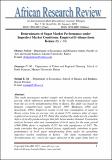Determinants of commercialization of African Indigenous Vegetables among smallholder farmers in Bungoma County, Kenya
View/
Publication Date
2024-04-04Author
Nambafu, Scolastica Nanjala
Bett, Hillary
Sibiko, Kenneth Waluse
Metadata
Show full item recordAbstract/
Rising awareness of various lifestyle diseases and illnesses has led to an increased understanding of healthy eating habits, the increased demand for African Indigenous Vegetables (AIVs), and a strict healthier diet in Kenya. Apart from the awareness about the benefits of consuming the AIVs, their commercialization is still low due to how producers are less informed and not connected to market actors beyond their community. On the other hand, the literature on factors that influence commercialization is still limited. The purpose of this study is to sought to reduce that gap by determining the factors that influenced the commercialization of African Indigenous Vegetables (AIVs) among smallholder farmers in Bungoma County. In order to identify 384 respondents from whom data was collected, multistage sampling was used through personally administered questionnaires. The fractional regression model (FRM) was used to determine factors influencing the commercialization of AIVs in Bungoma County. The FRM results indicate that the eight explanatory variables included in the model significantly influenced the commercialization of AIVs among smallholder farmers. These variables are the gender of the farmer, land size, mode of payment, distance to the markets, AIV yields, AIV cost of production, duration to reach the market, and value addition. The researcher recommended that all gender should be engaged in the commercialization of AIVs and that the government to put in place policies and regulations that support the commercialization of AIVs, as they support other cash crops, which would equally enhance the quality and quantity improvement of AIVs that are distributed to various markets.
Collections
Related items
Showing items related by title, author, creator and subject.
-
-
Gender perspective in the allocation, use of space and use of time in a periodic market. A case study of Kibuye market in Kisumu city.
LOO , Loice Onyango (Maseno University, 2015)Periodic marketing systems engage 84% of women working in the informal sector and are characterised by inadequate infrastructure and poor organisation. Allocation of space is on first come first served basis, disadvantaging ... -
Determinants of sugar market performance under imperfect market conditions: Empirical evidence from Kenya
Nelson Obange, GM Onyango, EM Siringi (2011)This study investigates market (supply and demand) factors causing high pricing, which influences performance of the locally manufactured sugar from the six (n=6) manufacturing firms in Kenya. The study was based ...

